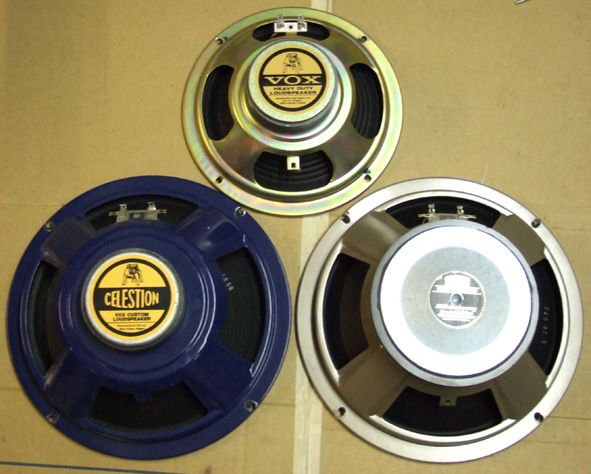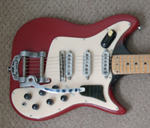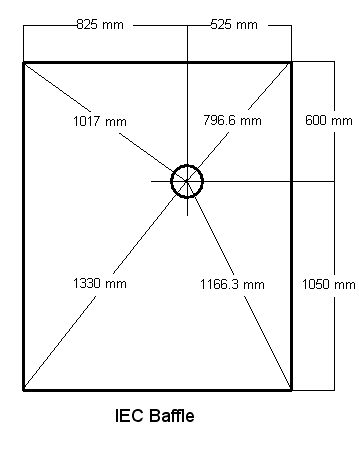Amp wattage & loudness has always mystified me.
Can anyone explain why my Vox Cambridge (30 watts) is only half as loud as my Fender Sidekick (25 watts) and nowhere
near as loud as the Vox AC30 (30 watts) that Rick uses at the Burnham club???
Thanks in advance.
Amplifier loudness
Moderators: David Martin, dave robinson, Iain Purdon, George Geddes
15 posts
• Page 1 of 2 • 1, 2
-

JimTidmarsh - Posts: 410
- Joined: Mon Sep 21, 2009 12:21 pm
- Location: South Woodham Ferrers, Essex, UK
- Full Real Name: Jim Tidmarsh
Re: Amplifier loudness
Hi Jim,
I wouldn't try to give a complete answer,but Watts are a measurement of electrical power, - Decibles are a measure of sound. The two are not firmly linked.
The speaker sensitivity is a major factor,the "Blues" for example are extremely loud compared to most speakers even in the same amps. Also,being a motorbike man it has always been my belief that Italian horses(as in horsepower) are bigger than Japanese horses,and I believe that valve watts seem to be bigger than transistor ones. Just gut reaction of course,but my old AC50 bass setup blows away my Ashdown 200.
Can't wait to hear the comments on this!!
Des.
I wouldn't try to give a complete answer,but Watts are a measurement of electrical power, - Decibles are a measure of sound. The two are not firmly linked.
The speaker sensitivity is a major factor,the "Blues" for example are extremely loud compared to most speakers even in the same amps. Also,being a motorbike man it has always been my belief that Italian horses(as in horsepower) are bigger than Japanese horses,and I believe that valve watts seem to be bigger than transistor ones. Just gut reaction of course,but my old AC50 bass setup blows away my Ashdown 200.
Can't wait to hear the comments on this!!
Des.
- des mcneill
- Posts: 324
- Joined: Thu Sep 17, 2009 1:30 am
- Full Real Name: des mcneill
Re: Amplifier loudness
des mcneill wrote:The speaker sensitivity is a major factor,the "Blues" for example are extremely loud compared to most speakers even in the same amps.
Perfectly right, speakers convert into sound only a fraction of the electrical signal coming out of the amps circuits (around 5% in the best case, often much less).
Another point is that valve amps sound subjectivly louder than transistors amps with the same watt rating, this is because of different behviour at maximum power.
A good way to improve a Vox Cambridge amp is to change the speaker for one with a higher efficiency, such as the Celestion G10 Vintage.

Left speaker is an original"Bulldog" 10" speaker from a Cambridge 30 amp, right speaker is a Celestion G10 Vintage. Both use ceramic magnet, but the G10 one is much bigger. Guess why it has a much higher sensivity...
The G10 can replace the Bulldog without any mechanical modifications. I have tested it with good results.
The smaller speaker on top is a 8" Bulldog from a Vox Pathinder 15R amp.
Another solution (both can be used) is to change the power output module, but I have not tested it.
Didier
-

Didier - Posts: 1943
- Joined: Tue Sep 15, 2009 10:57 am
- Location: West suburb of Paris, France
- Full Real Name: Didier Parot
Re: Amplifier loudness
The sensitivity of the amp is also a factor. By sensitivity, I mean the amount of gain supplied by the input stages. Since there is a limit to how hard you can hit guitar strings (before they break), there is a limit to the voltage output from the guitar. An amp with more input gain will sound louder when it's volume control is set halfway than one with the same volume setting and output power but which has lower sensitivity.
(At this point, Spinal Tap fans will start relating this to the theories of Nigel Tufnell . . . . . ..)
Ray L
(At this point, Spinal Tap fans will start relating this to the theories of Nigel Tufnell . . . . . ..)
Ray L
-

RayL - Posts: 1261
- Joined: Wed Sep 16, 2009 4:25 pm
- Location: Carshalton, Surrey
- Full Real Name: Ray Liffen
Re: Amplifier loudness
Thanks for your replies, guys.
I'm going to throw money at the solution and buy a modern Chinese Vox AC30 !!
I'm going to throw money at the solution and buy a modern Chinese Vox AC30 !!
-

JimTidmarsh - Posts: 410
- Joined: Mon Sep 21, 2009 12:21 pm
- Location: South Woodham Ferrers, Essex, UK
- Full Real Name: Jim Tidmarsh
Re: Amplifier loudness
This has recently become one of my favourite subjects after doing a bit of research related to my amp buying! We can blame it on Mr. Bell that there isn't a linear relationship between amplifier ratings in watts and output volume or loudness! He invented the decibel and the logarithmic relationship which defies logic!! 
Now, my 5 watt Epiphone Valve Special doesn't produce 1/10th the volume of a big 50 watt stonker - it's only half the volume! How is that fair? Put another way; to get twice the volume you need 10 x the power in watts - this is, of course, assuming that everything else is equal. One of the biggest factors in actual volume is the speaker sensitivity. A speaker listed as 102dB sensitivity is...um.. er...MUCH louder than one that is 97dB (It's late and I can't be bothered to calculate the difference - Didier will know!) A 100 watt amp is only twice the volume of a 10 watt! Crazy eh?
How is that fair? Put another way; to get twice the volume you need 10 x the power in watts - this is, of course, assuming that everything else is equal. One of the biggest factors in actual volume is the speaker sensitivity. A speaker listed as 102dB sensitivity is...um.. er...MUCH louder than one that is 97dB (It's late and I can't be bothered to calculate the difference - Didier will know!) A 100 watt amp is only twice the volume of a 10 watt! Crazy eh? 
So, if you want more volume out of any given amp, you could find a more sensitive speaker - one that doesn't moan every time you switch on and is understanding when you get home late!!!
And another thing - why didn't anyone tell me that to REDUCE the volume/output of a valve amp (Sometimes someone might want to) all you have to do is change the pre-amp ECC83 for an ECC82 or ECC81? Simples! See this month's "Guitar Buyer" for that useful snippet!
See this month's "Guitar Buyer" for that useful snippet!
Goodnight all! Lionel
Now, my 5 watt Epiphone Valve Special doesn't produce 1/10th the volume of a big 50 watt stonker - it's only half the volume!
So, if you want more volume out of any given amp, you could find a more sensitive speaker - one that doesn't moan every time you switch on and is understanding when you get home late!!!
And another thing - why didn't anyone tell me that to REDUCE the volume/output of a valve amp (Sometimes someone might want to) all you have to do is change the pre-amp ECC83 for an ECC82 or ECC81? Simples!
Goodnight all! Lionel
- Graylion
Re: Amplifier loudness
Graylion wrote:One of the biggest factors in actual volume is the speaker sensitivity. A speaker listed as 102dB sensitivity is...um.. er...MUCH louder than one that is 97dB (It's late and I can't be bothered to calculate the difference - Didier will know!)
You need to double the electical power to gain 3dB, so a speaker having a 100dB sensivity powered by a 15W amp will be as loud as a speaker having a 97dB sensivity powered by a 30W amp.
Speaker sensivity is measured in standard conditions (sound level in dB for 1W at 1M).
A Celestion Blue is rated at 100dB, speakers in budget amps are generally around 95dB, or lower.
This is why replacing the original speaker by one with a higher sensivity is an easy and efficient way to make a budget amp louder.
Didier
-

Didier - Posts: 1943
- Joined: Tue Sep 15, 2009 10:57 am
- Location: West suburb of Paris, France
- Full Real Name: Didier Parot
Re: Amplifier loudness
Don't blame Mr Bell, it's all to do with those things most of us have on the side of our heads, how they work and how they respond to the air pressure changes they detect (i.e. sound).
Ears are not linear things, they have a logarithmic response and the actual response changes depending on volume and frequency. Which is why a perceived doubling of volume equates to roughly 10dB for frequencies present in music.
Which is why volume controls and faders are made with a logarithmic response - so you hear a linear volume change.
To make it more interesting, the average ear will detect a volume change of around 65dB across those frequencies present in music for the same actual sound pressure (that's neither linear or logarithmic). So if you were to play an instrument which can range from a note as low as the ear can detect up to one as high as the ear can go and the instrument could generate those notes at equal pressure levels you would hear the volume steadily increase, then decrease, then increase again, then decrease.
On logarithms, guess what the mathematical shape of the bell of a brass instrument is.
As an aside, ears are less sensitive to frequency extremes at low volumes which is why you will often see "smiley faces" on graphic equalisers to even things out. Unfortunately a lot of people don't understand that the ears even out above around 100dB and the "smiley face" is no longer wanted with the result that you get a boomy, squeaky sound at high volume. But I digress.
As has been quite rightly said, 1W into a speaker with a sensitivity of 100dB 1W 1m and you will hear 100dB at 1m, but that's not the whole story. Sensitivity is given for either a single frequency or a range of frequencies so 2 speakers with the same sensitivity could sound at different levels if either the input frequency range changes or the frequency response of the speaker is different.
And dynamic range over a period of time (a matter of a milliseconds) will also affect perceived loudness (dynamic range=range of actual pressure levels). So if you were to listen to music which quickly ranges from low to high SPL (sound pressure level) if would appear quieter than one which has a lower dynamic range even if the average SPL was the same. This is why compressors make the music seem louder (and why compression is popular in a lot of rock music recordings).
Then you've got the factor of the dispersion of sound from the speaker cabinet. As you move off from directly in front of the amp to one side, the sound will get quieter - how much by depends on the design of the cab.
With guitar amps, the design and characteristics of which will produce a different dynamic range, different harmonics (i.e. frequencies, valves vs transistors etc) and have different capabilities of producing the output power they actually claim to produce and, of course, different speakers and cabinet design, it is easy to see how 2 different 30W amps can produce a big difference in perceived volume.
Bob.
Ears are not linear things, they have a logarithmic response and the actual response changes depending on volume and frequency. Which is why a perceived doubling of volume equates to roughly 10dB for frequencies present in music.
Which is why volume controls and faders are made with a logarithmic response - so you hear a linear volume change.
To make it more interesting, the average ear will detect a volume change of around 65dB across those frequencies present in music for the same actual sound pressure (that's neither linear or logarithmic). So if you were to play an instrument which can range from a note as low as the ear can detect up to one as high as the ear can go and the instrument could generate those notes at equal pressure levels you would hear the volume steadily increase, then decrease, then increase again, then decrease.
On logarithms, guess what the mathematical shape of the bell of a brass instrument is.
As an aside, ears are less sensitive to frequency extremes at low volumes which is why you will often see "smiley faces" on graphic equalisers to even things out. Unfortunately a lot of people don't understand that the ears even out above around 100dB and the "smiley face" is no longer wanted with the result that you get a boomy, squeaky sound at high volume. But I digress.
As has been quite rightly said, 1W into a speaker with a sensitivity of 100dB 1W 1m and you will hear 100dB at 1m, but that's not the whole story. Sensitivity is given for either a single frequency or a range of frequencies so 2 speakers with the same sensitivity could sound at different levels if either the input frequency range changes or the frequency response of the speaker is different.
And dynamic range over a period of time (a matter of a milliseconds) will also affect perceived loudness (dynamic range=range of actual pressure levels). So if you were to listen to music which quickly ranges from low to high SPL (sound pressure level) if would appear quieter than one which has a lower dynamic range even if the average SPL was the same. This is why compressors make the music seem louder (and why compression is popular in a lot of rock music recordings).
Then you've got the factor of the dispersion of sound from the speaker cabinet. As you move off from directly in front of the amp to one side, the sound will get quieter - how much by depends on the design of the cab.
With guitar amps, the design and characteristics of which will produce a different dynamic range, different harmonics (i.e. frequencies, valves vs transistors etc) and have different capabilities of producing the output power they actually claim to produce and, of course, different speakers and cabinet design, it is easy to see how 2 different 30W amps can produce a big difference in perceived volume.
Bob.
- Bob Dore
Re: Amplifier loudness
Bob Dore wrote:As has been quite rightly said, 1W into a speaker with a sensitivity of 100dB 1W 1m and you will hear 100dB at 1m, but that's not the whole story. Sensitivity is given for either a single frequency or a range of frequencies so 2 speakers with the same sensitivity could sound at different levels if either the input frequency range changes or the frequency response of the speaker is different.
Theorically, speakers efficiency are measured in standard conditions, which means using a wide spectrum signal (white noise) with the speaker installed on a standard IEC baffle, in non reverberant conditions.

Which makes the rating independant from a single frequency measure.
Here is the frequency response of a Celestion Blue speaker rated as having a 100 dB efficiency :

As you can see, like for all guitar speakers, the frequency response curve is very far from linear, and the sensivity is higher than 100 dB between 2Khz and 4KHz, and lower below 400Hz.
Didier
-

Didier - Posts: 1943
- Joined: Tue Sep 15, 2009 10:57 am
- Location: West suburb of Paris, France
- Full Real Name: Didier Parot
15 posts
• Page 1 of 2 • 1, 2
Who is online
Users browsing this forum: No registered users and 59 guests
These advertisements are selected and placed by Google to assist with the cost of site maintenance.
ShadowMusic is not responsible for the content of external advertisements.



